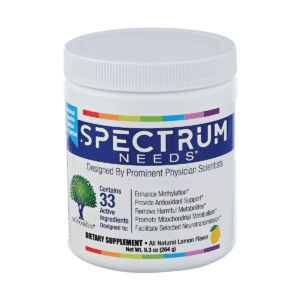$84
Manganese
Manganese is a mineral that must be obtained in the diet and is required in trace amounts. Manganese is a cofactor in several enzymes, many of which are particularly essential in the detoxification of superoxide free radicals, including manganese superoxide dismutase, which is the principal antioxidant in mitochondria. Several lines of evidence support the notion that some children with ASD have abnormal redox metabolism. Other manganese-containing enzymes play important roles in the metabolism of carbohydrates, amino acids, cholesterol, and neurotransmitters. Side effects are rare at usual doses used in supplementation.
 Manganese in Spectrum Needs
Manganese in Spectrum Needs
Manganese is added in order to provide a wide basis of nutrition, and based on its importance in manganese superoxide dismutase and other key cellular antioxidants. Side effects are unexpected.
Manganese is a mineral that must be obtained in the diet and is required in trace amounts.
Manganese is a cofactor in several enzymes, many of which are particularly essential in the detoxification of superoxide free radicals. One such enzyme is manganese superoxide dismutase, which is the principal antioxidant in mitochondria. Other manganese-containing enzymes play important roles in the metabolism of carbohydrates, amino acids, and cholesterol. Glutamine synthetase, is a manganese-containing enzyme in the brain that converts the amino acid glutamate (itself an excitotoxic neurotransmitter) to glutamine.
Manganese is required in trace amounts and deficiency in humans is not well described.
In one study, manganese was the second most deficient mineral found in autistic children (55% in ASD and 8% in controls; https://www.ncbi.nlm.nih.gov/pubmed/26656556). The role of manganese in the treatment of autism is not well studied, and existing studies are mostly aimed at environmental metal toxicity. Individuals with ASD demonstrate reduced uptake of manganese than their unaffected twins (https://www.ncbi.nlm.nih.gov/pmc/articles/PMC5461492/pdf/ncomms15493.pdf). Several lines of evidence support the notion that some children with ASD have abnormal redox metabolism (this topic is reviewed in https://www.ncbi.nlm.nih.gov/pmc/articles/PMC4910649/pdf/cmped-10-2016-043.pdf). Oxidative damage to proteins has been documented in the brain and other tissues in ASD. Redox abnormalities have been linked to mitochondrial dysfunction in children with ASD, and mitochondrial dysfunction is one of the most prevalent metabolic disorders in ASD.
Manganese is a remedy for sprains, arthritis, and other connective tissue condition involving inflammation due to its role in manganese superoxide dismutase. Manganese supplements have also been used for seizures and osteoporosis, and to promote wound healing.
Side effects are rare at usual doses used in supplementation. Manganese is considered to be safe at doses under 11 mg a day in adults.
Laboratory testing is available, but is generally used to detect environmental toxicity.
How and Why is Manganese Used in Spectrum Needs
Order SpectrumNeeds Today
Formulations









 Manganese in Spectrum Needs
Manganese in Spectrum Needs